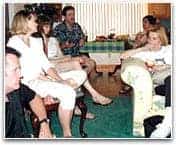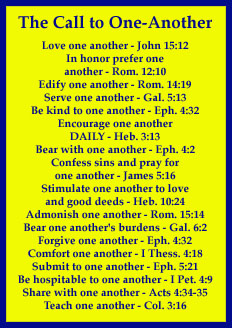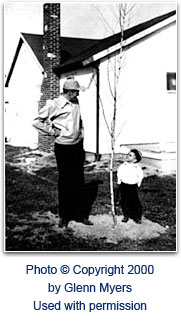Questions About Body Life
Questions About Body Life
By Wayne Jacobsen
BodyLife • August 2001
 Sharing the journey has always been an important part of BodyLife. I am continually amazed at the people that God allows to cross our paths who are also paying the cost to follow his Spirit and discover how to live with God and live in his body with all the joy and freedom that he desires for us to know.
Sharing the journey has always been an important part of BodyLife. I am continually amazed at the people that God allows to cross our paths who are also paying the cost to follow his Spirit and discover how to live with God and live in his body with all the joy and freedom that he desires for us to know.
For those who think that church involvement is about commitment and accountability, I wonder if they haven’t missed what being part of Christ’s body is all about. We don’t engage other believers because we have to, but because it is inconceivable for us not to share a partnership with other brothers and sisters who are on the journey of becoming like him. We find their friendship, wisdom and support a wellspring of the Father’s provision for our own journey.
Remember, Paul indicates that individually we only know in part and gaze on him as if on a poor reflection of a mirror. (I Cor. 13:9-12) But when he refers to the insight offered through the incredible networking of the Body of Christ, he calls it, “the fullness of him who fills everything in every way.” (Eph. 1:23)
It amazes me the instant connection that happens between people on a similar journey. I may step off of a plane and meet someone new or find an email pop up in my ‘inbox’ and sense almost immediately that God has us on similar journeys and that we can encourage and enlighten each other as we wander a bit further down the road.
Of course it’s best to find it just down the street or across town where I can get together more frequently for that kind of fellowship. I don’t seek out such relationships because I ‘should’ but because I just can’t imagine staying on this journey without them. If you’ve gotten out of that habit with folks near you, ask Father to make some connections for you or follow-up on some he’s already given you.
We’re going to live that out a bit in this issue of BodyLife. I’m going to let you look over my shoulder at some of the correspondence I have had over the last three months. It seems the last issue, “Why I Don’t Go to Church Anymore,” struck a nerve for many people. For some it spawned questions that were germane to their own struggles. For others it sparked interesting insights. I thought you might be encouraged to hear some of their stories and some of my responses (in red). Enjoy the feast:
G.C., from South Carolina
We are enjoying both of your books and wish we could find friendship with someone in our community with same thinking. Some friends have started a “home fellowship” but as much as I hate to say this, it is really the same old thing. We desire real friendships but it is hard to find. We are out of the institutional church and know several couples who do not go to church anymore, but this concept seems so foreign to anyone. They have been so hurt, they rather stay home, but are so empty and unhappy. This stage of our life has become quite difficult. My husband was always an “elder” in the church. We just don’t seem to know what to do now. Seem to be lost. Please pray for us.
Wayne: Though it may feel like it, I’m sure you’re not lost. God knows where you are and he is able to place you among his body just as he desires. That may not look like anything you’ve imagined before, but it will be better than you’ve ever known. But you have my compassion and my prayers. I know how difficult these times can be, especially when others have not only gotten burned out on religion, but also burned out on walking with other believers. Perhaps they need some time for the old hungers to surface again. It is amazing the kind of damage that religion can inflict on people. If it would ever be valuable for me to come by and see who among God’s people we might be able to encourage there, just let me know.
C.G., Texas
I recently read your article in the May edition of BodyLife. Thank you for sharing some light on an issue that is really a concern in my family’s life. We all want to follow Jesus, but our experience with churches is like the old saying, “water, water, everywhere, not a drop to drink…” I have wrestled with guilt and keep wondering if there isn’t something wrong with me, as we have never really felt like we have found a “home” with any church. We have been a part of 4 churches over the past 25 years. When I left (the last one) six years ago, I wrote (the pastor) to ask for his blessing. He replied by sending me a tape on loyalty and no blessing. I know he meant well because he loves me and wants me with him. My reply was similar to your article, “I am a part of the same church, we are brothers and friends and I will be loyal to you for life. I love you…we are both a part of Jesus.” Six years later, we struggle with similar issues. (Now we) are elders at a “revival” church, and when asked recently in an elders’ meeting if anyone had any concerns about a specific service, I answered honestly. (In a recent service), I felt people may have been confused or troubled by the message (as opposed to enlightened and comforted)… I got a phone call from the pastor later that night warning me to “never again” put him down “in public.” Keep bringing light and life to people… Thanks for your kind and affirming words…WOW someone understands! Why is it difficult to keep it simple… love Jesus with all our hearts, and love others.
Wayne: I am so sorry for the painful experiences you’ve been through but am also incredibly blessed that you have continued to put your conscience above the ‘conformity dynamics’ of organized religion. I know how confusing and disillusioning it can be when relational life takes a back seat to the needs of the institution and those who think they are ‘kings’ in those institutions. But disillusionment can be a great thing. If we are disillusioned that simply means we had illusions that needed to be dissed. The reason God allows that to happen is to help us see him as he really is and the church as he is really making her to be.
It’s a marvelous journey, though incredibly painful at times as you seem to know all too well. My heart does go out to you because I know it is not easy to have hungers for God’s presence to be central in his body, where honesty and openness can shape an environment that is safe for all, and only to find that others are not thinking that way at all.
But God is doing something in you that will make you a freer person and thus a more authentic witness of the life of God he wants to pour out through you to others. Keep on, Brother! The best is not far ahead and you will find the joy absolutely overwhelming.
S.V., South Africa
I have been blessed to read a couple of your articles as confirmation of what the Lord has done in our church during the last year. We need witnesses to know that we are not crazy!! I resigned as a “pastor” more than a year ago. I felt that (God) said to me, “I will keep you accountable for every structure that you keep in place that focus people’s eyes on you or on the organization so that they cannot see Me.” I know that the problem is in our hearts and that structure is in itself innocent, but used by us to make a name for ourselves. We had about 150 – 200 people attending meetings before the changes, now we have about 40 -60 and it is still falling. I pray that, if this is what the Father wants, we will find a place of relationship that will be fruitful for us and those around us in future. In your experience – can we turn a fellowship around into the freedom of a relational community or should we close the Sunday service completely and go with those who have the vision?
Wayne: What a joy to know someone willing to risk so much to follow the Lamb wherever he leads. Absolutely we cannot turn around a group of people, and I know that isn’t exactly what you’re asking. Turning around a group of people is a work of God not man. Keep doing what he’s asked you to do, making sure you’re following voice in the context of the principles he’s taught you, not to principles in the absence of voice. There are a zillion ways God can lead you. To keep the Sunday morning as a training time while recognizing that it really isn’t church and encouraging people to find a live real church in their homes via relationships with others. When we manage those groups, people usually end up dependent on us instead of Jesus. Or, God may have you close it down and go with those who have vision and let God give birth to a whole new deal… I don’t think there is a right or wrong here. I’ve seen God do it many different ways in many places.
For the most part, however, I rarely see groups ‘turn around’. Some will, many won’t. Often those who want to change get forced out by those who want to save the institution. More rarely the people who don’t want change fade away into other institutions that they see as more ‘stable.’ What does God want for you? I don’t know. I will pray, however, that he gives you wisdom together and that you have the courage to follow what he settles in your heart even if it looks crazy to your natural man, or to others around you. That’s the toughest part of the journey.
How large is this move worldwide?
Wayne: It is broad at least by the emails and contacts I’ve had, but I don’t think it is a movement yet, nor do I hope it ever becomes one. Once it moves from people following Jesus to those replicating a pattern, it will die. The hunger to get back to Jesus at the center of his church is huge. But it manifests itself in a variety of ways. Not all ‘decentralized’ groups are healthy either. Some have just rejected organized religion out of disillusionment, and have not grown closer to Jesus to let him change them. That’s sad and their forms can become even more manipulative and controlling.
It seems to me that people are looking for a king, like Israel with Saul, and for a high priest, as with Israel when they wanted Moses to speak to God for them, and men are just too willing to take up those positions.
Wayne: I think so too and I find that sad.
There is a definite feeling of guilt in me and fear that I will not be doing what God called me to do and that I will end up in my comfort zone, totally ineffective in the Kingdom. This represents my biggest struggle over the last couple of months. If I remain faithful to what I believe He has said to me, I may not look successful, or effective, but at least I will be found a faithful steward.
Wayne: Here we see exactly how the power of the institution works. It presses us into conformity to its aims by manipulating our desire to be thought successful by others. No doubt, this is one of the hardest bonds the Spirit needs to break in our hearts. When colleagues, former ‘parishioners’ and others bring their judgments on us for not meeting their expectations we really find out whether or not it is God we follow, or whether we’re being tyrannized by other men’s opinions of us. Remember Paul’s words, “If I wanted to please men, I wouldn’t be a servant of Jesus Christ.” He was talking there about other brothers not people in the world. All I can tell you, is that I think I see and hear clearly the leading of God in your life. I know it is costing you far more to follow it than you ever dreamed. But I suspect at its end the fullness of God’s life will flow out of you more than and touch lives you never imagined.
Jesus entered into the obedience of the Kingdom through suffering and He said that it is through much tribulation that we will enter ourselves, so there seems to be no short cut to the place of rest that I am craving. The question remains x how do I detect the deception that will bind me into my own world of inner turmoil and make me totally inefficient? Maybe the safeguard lies in “exhorting one another daily” – that is why I am exposing my heart to you and to some other witnesses as well.
Wayne: Those certainly help, but ultimately we have to trust him to finish what he has begun in us. Our eyes must always be on him. When people ask me, “Wayne, are you confident that you can hear God’s voice clearly?” I have second thoughts about that because I don’t have that much confidence in me. But the real question is, “Wayne, do you think God is big enough to make his will clear to you?” That’s a question that gets a resounding YES! He is big enough. He has done it even at times when I was deeply ensnared by my own selfishness and ego. I’ve no doubt he can to it today.
The problem seems to be in our hearts – and how are we going to overcome it? When am I making a name for myself? When am I operating as a teacher with a heart that enjoys it when people call me “teacher” in their hearts without using the title? Jesus I believe was adamant that we should not call men “leader or teacher” or any title, because He knew about this problem. One of the most difficult things I have experienced in the last 10 months since I have resigned as “pastor”, is what I see in the eyes of the people and the children. There is a position in the soulish arena that people give to leaders that put them on a pedestal and that leaders enjoy despite their protestations to the contrary. This is what I missed the most and I am appalled by this!!!! Who will deliver me?
Wayne: He already is! The day will come when you will despise such titles and power as you continue to see how they’ve prevented you and others from really seeing God’s church as it is and living as the church with great joy and power. That you are appalled by the desire in yourself to bask in the accolades of being the local- holyman-guru, is a certain sign that you are well on the way to liberty.
Sorry that I did not respond earlier. I had to work through some issues before I could find the time and also understand what the Holy Sprit wanted (to say).
Wayne: No problem! I would much rather you sort these things out with God and use anything I might say as a supplement to what he’s showing you than the other way around. I enjoy where the Lord has led you and the things he has seeded deeply in your conscience. You couldn’t walk where you are walking if he had not been opening your eyes. The things that burn on your heart are definitely from him. The fact that you’ve been willing to pay a tremendous cost to follow them is even further validation. Personal expedience will never lead someone down the path you’re taking.
Sometimes conscience can be a challenging thing to live with. Wouldn’t it be easier just to give in and go along, making the most of a religious system that can do some good, and have others stroke us with their affirmations? But the life is not there. That is an illusion that promises what it cannot deliver. Continue to follow what God has put in your heart. When the old dies away you will find a greater joy, freedom and fruitfulness than you ever imagined.
Note: This email exchange went on to consider issues of elders, leadership, paying salaries and meeting together. It did not fit in our snail-mail version, but I have included the rest of our exchange on another page if you’d like to continue reading.
A.M, Massachusetts
I have a question for you. It is rather a personal one so if you’d rather not answer, I’ll certainly understand: Taking into consideration all we have come to know about “Instead of filling our children with ethics and rules we need to demonstrate how to live in God’s life together” what would you have done differently in raising your children? Wayne, I can’t tell all that is in my heart about how much I appreciate your teaching. Please continue to let His truth flow through you.
Wayne: I don’t mind trying to answer at all… I don’t know that there is a lot we’d do differently. I think we did raise our kids in a relational context and taught them how to depend on God when they sinned or failed. I’m pretty grateful for that. We also had them involved in home fellowships right along side other families for most of their growing-up years, so that was good too. The one thing I wish I had done differently now is not linking their acceptability with me to their performance. When I was disappointed in their actions I often distanced myself as part of their ‘punishment.’ That’s how I saw God treating me, so I did it to them. Now that I know he doesn’t, I regret doing it to them. I am grateful however that God is bigger than our (lack of) parenting perfection and they seemed to have gotten through it fine. I have, however, discussed it with them and asked their forgiveness…
Download Article:
- Download Article PDF (112 KB)




 Dear Fellow-believer,
Dear Fellow-believer, I heard the words, but was so shocked by them that for a moment I doubted my own ears. I was sitting at the table of a woman who was ready to divorce her husband of two years. I knew the abuse she had suffered at her new husband’s hands and the risk she felt that her children from a previous marriage were under in continuing to live with him.
I heard the words, but was so shocked by them that for a moment I doubted my own ears. I was sitting at the table of a woman who was ready to divorce her husband of two years. I knew the abuse she had suffered at her new husband’s hands and the risk she felt that her children from a previous marriage were under in continuing to live with him.
 By Wayne Jacobsen
By Wayne Jacobsen No matter how independent we humans may try to be, there are times we can’t help wanting to share with others.
No matter how independent we humans may try to be, there are times we can’t help wanting to share with others. Thus the root of the problem is not our institutions, but our own self-needs and our attempts to get other people to fill up in us what we lack in our own relationship with God. You can almost find Scriptures to underscore that mistaken notion because God clearly works through others as the extension of his own hand. But that doesn’t mean that Jesus builds his body based on our self-needs. Far from it!
Thus the root of the problem is not our institutions, but our own self-needs and our attempts to get other people to fill up in us what we lack in our own relationship with God. You can almost find Scriptures to underscore that mistaken notion because God clearly works through others as the extension of his own hand. But that doesn’t mean that Jesus builds his body based on our self-needs. Far from it! “Majesty, worship his Majesty…” The familiar words rolled off my lips as I sat among a group of believers from all over the western U.S. who had gathered to share their experiences in relational church. It was Sunday morning and we were just beginning with a chance to sing songs of praise and thanksgiving for God.
“Majesty, worship his Majesty…” The familiar words rolled off my lips as I sat among a group of believers from all over the western U.S. who had gathered to share their experiences in relational church. It was Sunday morning and we were just beginning with a chance to sing songs of praise and thanksgiving for God. “Everything God is calling me to right now seems wrapped up in this picture,” Glenn told me as he laid the picture on the table.
“Everything God is calling me to right now seems wrapped up in this picture,” Glenn told me as he laid the picture on the table. Look closely at the father. He seems to admire his son with great affection, while at the same time he is completely at peace. With his arm casually resting on his hip he also doesn’t seem to have a care in the world. For that moment he
Look closely at the father. He seems to admire his son with great affection, while at the same time he is completely at peace. With his arm casually resting on his hip he also doesn’t seem to have a care in the world. For that moment he “That’s me!” Glenn finally told me, “the little boy there! I was two years old!”
“That’s me!” Glenn finally told me, “the little boy there! I was two years old!” By Wayne Jacobsen
By Wayne Jacobsen To hold something so beautiful for himself was unthinkable.
To hold something so beautiful for himself was unthinkable. How quickly the Galatians had lost sight of it! According to Paul, they had had a clear revelation of the crucified Christ and the glory it produced. They had experienced a work of the Spirit that had captured their heart and had swept them to the heights of what it meant to know Jesus.
How quickly the Galatians had lost sight of it! According to Paul, they had had a clear revelation of the crucified Christ and the glory it produced. They had experienced a work of the Spirit that had captured their heart and had swept them to the heights of what it meant to know Jesus.